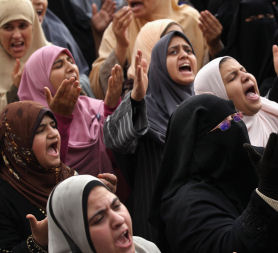Egypt: protesters remain as talks progress
Protesters remain in Cairo’s Tahrir Square, as Egypt’s politicians begin talks to end the political crisis, and a senior Google executive is released after a week in custody.

The protesters say they will not leave until President Hosni Mubarak steps down – but he insists there will be “chaos” if he does that now, and instead wants to leave ahead of the next election, in September.
On Sunday, Egyptian political leaders, including the banned Muslim Brotherhood and Vice-President Omar Suleiman, met for talks about how to progress the situation, as the US President Barack Obama said he hoped a representative Government would soon emerge.
Next week we will see Egypt moving from one stage of development to a major plunge to a new era. Egypt’s Foreign Minister Ahmed Aboul Gheit
In an interview with Fox News, he said that only Mubarak knew when he would step down, but stressed that he did not believe Egypt could go “back to what it was” after the uprisings of the last two weeks, in which around 300 people have died.
Deadlock
For now, the political sides remain in a deadlock, as the country attempted to get back to some sense of normality on Monday, with some banks and schools expected to re-open.
But the crisis is by no means over, with protesters pledging more action over the course of the week.
The senior Google Middle East executive, Wael Ghonim, was released by the authorities after being held in custody for more than a week. Ghonim, who is a spokesman for the youth movement in Egypt, tweeted: “Freedom is a blessing”.
Jon Snow writes: Our involvement in Egypt's predicament becomes clearer by the day. So too does the potential value of WikiLeaks in our understanding of what we are looking at.
I met a seasoned UK spook the other day who, before I had looked back at what WikiLeaks has to say about him, revealed that Omar Suleiman (Mubarak's emergency pick for Vice President) is "no democrat". He added that he is "an extremely clever man", but certainly "not a man to desert the NDP way of doing things". This was an oblique reference to Mubarak's political party (whose HQ the protesters burned to the ground in their first invasion of Tahrir Square).
Many of the "thugs" who have attacked and intimidated protesters and media alike in Cairo were carrying NDP party cards. In short my excellent source confirmed that Mr Suleiman's leadership of Egypt's General Intelligence Service has been one in which torture and human rights abuse have been endemic.
Indeed, one of the reasons that Suleiman is well known to both the British and the Americans, my informant claims is that he was the "rendition interface" for coalition forces in Iraq. In other words, the allegation is that, if the coalition required information from a reluctant individual, transhipment arrangements to Egypt for interrogation were sorted through Suleiman's office.
Read Jon Snow's blog - Egypt, rendition and Mubarak's Vice President.
However in an interview with Channel 4 News, Egypt’s Foreign Minister Ahmed Aboul Gheit said that President Mubarak “will stay in power until September”.
He said that it was vital to maintain a “constitutional process” now that Egypt had been transformed by the protests. And he said recent events had been “a good thing” because they had not resulted in tanks firing on people – “as we saw 20 years earlier in China”.
He said: “Next week we will see Egypt moving from one stage of development to a major plunge to a new era.”
Watch: Krishnan Guru-Murthy interviews Egypt’s Foreign Minister Ahmed Aboul Gheit
Concessions
Politicians offered concessions to protesters over the weekend, including drafting a “road map” for talks on political reform, as well as moves to release jailed activists, guarantee press freedom and lift Egypt’s emergency laws.
President Mubarak attended a Cabinet meeting today, announcing a 15 per cent increase in public sector pay and an increase in the subsidy for sugar, in a move aimed at winning over support from the poorer parts of the community.